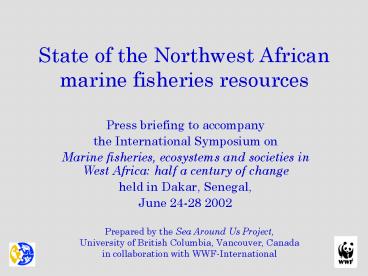State of the Northwest African marine fisheries resources PowerPoint PPT Presentation
1 / 17
Title: State of the Northwest African marine fisheries resources
1
State of the Northwest African marine fisheries
resources
- Press briefing to accompany
- the International Symposium on
- Marine fisheries, ecosystems and societies in
West Africa half a century of change - held in Dakar, Senegal,
- June 24-28 2002
Prepared by the Sea Around Us Project, University
of British Columbia, Vancouver, Canada in
collaboration with WWF-International
2
West Africa has a long tradition of fishing, via
both local and distant water fleets
This graph illustrates the reach of
Ghanaian fishers during the period up to 1959
3
The fish wealth of West Africa has also attracted
distant water fleets from other continents
Number of country access years by area,
1960-1969
4
and these have increased tremendously over the
years
Number of country access years by area,
1980-1989
5
finally reaching the present, staggering levels.
Number of country access years by area,
1990-1999
6
What is the impact of all this fishing on the
resource base?
- We show this impact for the countries of the
Northwest African sub-region using a methodology
previously applied to the North Atlantic and
which is documented at www.fisheries.ubc.ca - This methodology is based on maps of catch data
and twenty ecosystem models, as presented at the
Dakar Symposium by Villy Christensen, Reg Watson,
and other members of the Sea Around Us Project.
7
Fish biomass in 1950(excluding small pelagics)
8
Fish biomass in 1975(excluding small pelagics)
9
Fish biomass in 1999(excluding small pelagics)
10
The reason for this is fishing intensity, which
was low in 1950
11
but increased tremendously over time
12
finally reaching the very high present levels
of fishing intensity.
13
Biomass
In summary, we have
Fishing
intensity
Catch
1950
1999
14
Or, put differently
15
Thus, we have found for West Africa, similar
trends as for the North Atlantic
Fishing intensity
Biomass
1900
1999
16
Conclusions
- The fish resources and ecosystems of Northwest
Africa are as depleted as those of the North
Atlantic and the fisheries are not sustainable - Surplus fishing vessels shifted from the North
to the South will not increase catches - Rather, they will continue to undermine the
development and food security of the West African
countries.
17
Acknowledgements
- Colleagues in West Africa, notably the members of
the EU-funded SIAP project (Fisheries Information
and Analysis System) - The Environmental Program, Pew Charitable Trusts
- The Sea Around Us Project Team at the Fisheries
Centre, UBC, Vancouver, notably Villy Christensen
(biomass maps), Reg Watson (catch maps) and
Jackie Alder (country/fishing access maps).

